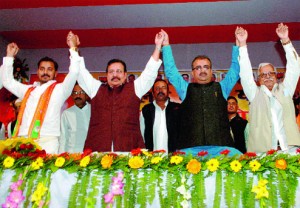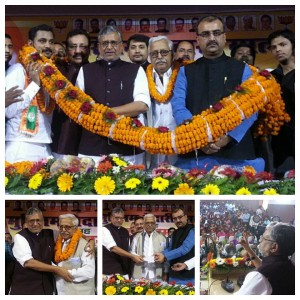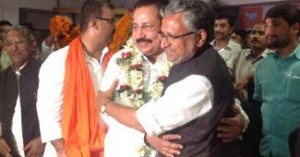The product of plus and minus is always minus. In the den of the corrupt and (power)-drunk it is virtually impossible to bring in sanity and honesty. But the sacked minister of excise of Bihar, Jamshed Ashraf, tried to do so only to be thrown out in the street.
On February 18 he became the first minister of Bihar to be dismissed – even before he submitted his resignation – after many years, and that too for exposing corruption in the chief minister Nitish Kumar’s secretariat.
Jamshed has certainly earned a lot of support and sympathy in his campaign as he was considered the only minister in the Nitish Kumar cabinet, who is honest. In fact he never lived in the ministerial bungalow nor has he taken state’s money for air trips. Though originally from Begusarai in Bihar, Jamshed has a big business in Mumbai and started living in Patna regularly only after becoming a minister.
Now even many ardent admirers of Nitish Kumar have started admitting that he is heading the most corrupt government since independence with bureaucrats ruling the roost and media, for their own business interest – read advertisement – showering praise on him. But then Jamshed needs to answer a few questions too.
Being the chairman of the Bihar Haj Committee, enjoying ministerial status, what prompted him to accept the excise portfolio? When Maulana Nizamuddin of All India Muslim Personal Law Board and Imarat-e-Shari’ah counselled him not to take up the portfolio both he and Nitish Kumar pooh-poohed the respected religious leader by stating that there is nothing un-Islamic in it.
Whatever may be his argument for joining this ministry on April 13, 2008 the truth is that he fell into the well-laid strategy. I repeatedly wrote about it in different magazines. Ever since the Nitish Kumar government introduced New Excise Policy on July 1, 2007 to boost up the state exchequer it was in search of a teetotaller as the minister and departmental secretary. It needs to be mentioned that new wine shops came up in almost every village panchayat and locality of Bihar in no time. Its number increased manifold, a large number of them illegal. Throwing all norms and rules to the wind wine shops cropped up near mosques, mandirs, schools, hostels, hospitals, etc. In many places the local people resisted the move, only to be booked in false cases. One vivid example is of Ramna Road in the heart of Patna, where a wine shop came up just in front of a girls’ hostel and stone throw distance away from a mosque.
The only sector where the state witnessed rise in revenue in the last couple of years is the excise taxes, but at great social cost. Corruption increased manifold so did the crime, but the Press remained silent.
To hide the rampant corruption Nitish in the beginning made Sudha Srivastava, a woman, Gandhian and niece of Lok Nayak Jay Prakash Narayan excise minister. And the Excise Secretary of the state was none else but Amir Subhani, the 1987 batch IAS topper of India. Newspapers of Bihar on the eve of the implementation of New Excise Policy on July 1, 2007 carried photos of woman minister and a Muslim IAS with flowing beard – he is associated with Tablighi Jamaat – explaining to the newsmen the good thing about the new government move and how the state exchequer will go up.
Then on April 13, 2008 Nitish made a cabinet reshuffle and appointed Jamshed Ashraf excise minister, while Subhani continued to be the departmental secretary. The plan was simple: since these gentlemen are ‘religious’ Muslims and would not take any interest in the liquor business it would give the mafia a free hand to loot and get anything passed.
A year later, in 2009, Subhani was made Home Secretary of Bihar and in his place a young IAS officer, N Vijaylakshmi, was made the Excise Secretary. Her husband S Siddharth is the Secretary to the Chief Minister.
Jamshed directly charges Vijaylakshmi and the Joint Commissioner of the Excise Department with rampant corruption. He also said that earlier her predecessor, Amir Subhani, and the chief secretary, Anup Mukherjee over-ruled his objections on certain files and subsequently took the Chief Minister’s consent.
The big question is as to how this all came to light, as in Bihar no print media is prepared to write anything against the Chief Minister. The reason is at least 7-8 fold increase in the state government advertisements to newspapers. On November 24 every year advertisements worth millions of rupees are given to newspapers as it was on this very date in 2005 that Nitish became the Chief Minister.
In the last three years only the Public Relations Department, not to speak of other departments of the Bihar government, had spent Rs 80 crore on advertisement. An RTI activist got this information after much difficulty. Once again no newspaper carried this news. Only ETV Bihar and bihartimes.com, a news portal, did highlight the news as they do not have to care much about the government advertisements.
Whenever any newspaper did dare and write something independently the advertisements are stopped and the concerned journalist rebuked by the management. In one case a journalist was even sacked as he wrote something good about Lalu Prasad’s then railway ministry. A Resident Editor left for job outside Bihar and another journalist too did the same. A senior Hindi journalist working in a newspaper in UP refused to join when he was offered a job in Bihar as Deputy Resident Editor.
Then how did all the news about scam came into the light. The truth is that Jamshed wrote a letter to the Chief Secretary pointing out large scale corruption on September 16, 2009. As nothing happened, he handed over a nine-page letter to the Chief Minister personally on January 14 last cabinet meeting, which took place in a floating restaurant, M V Ganga Vihar. Once again nothing happened.
However, after January 14 the Bihar government for the fifth time stopped the advertisement to Dainik Jagaran as it carried a story, which was not liked by the Chief Minister. The management begged for forgiveness but the government refused to give advertisement. All this was reported in a Delhi-based news-portal on media called bhadas4media.com.
When all efforts failed, Dainik Jagaran on February 12 carried an eight-column banner headline exposing the letter written by Jamshed Ashraf to the Chief Minister on January 14. This came as a bolt from the blue. While Hindustan Times followed the story, its Hindi edition Dainik Hindustan did not do any follow-up story. The Times of India, the group, which gave Business Reformer of the Year 2009 award to Nitish Kumar completely blacked out the whole episode till the sacking of Jamshed on February 18. However, the local television channels, such as ETV Bihar, Sahara Samay and news portal bihartimes.com started playing up the story. The Bihar government as a damage limitation exercise started releasing advertisement to Dainik Jagaran, but by then it was too late. Jamshed, on his part, denied that he leaked the letter out to the media.
The corruption in Excise Department is just a tip of the iceberg. Charges of scams in road construction, flood relief, health department, education, NREGA, etc. are now being levelled not by any opposition or the media but by Nitish’s closest friends.
The state unit Janata Dal United chief, Lallan Singh, quit the post citing autocratic style of functioning of the Chief Minister and bureaucratic highhandedness. The strange aspect is that barring Monazir Hassan, a party MP, no senior leader came in support of Nitish Kumar on Jamshed issue.
Jamshed has learnt his bitter lesson the hard way. His political journey from Zam Zam (he was the former chairman of the Haj Committee) to liquor came to an end. Let us see how he fares in his next innings. But one thing is clear: he went down in the history as the first minister to be dismissed in Bihar simply because he dared to expose corruption at the top most level in the state. He still insists a probe into this scam by the CBI, Vigilance or Accountant General.



